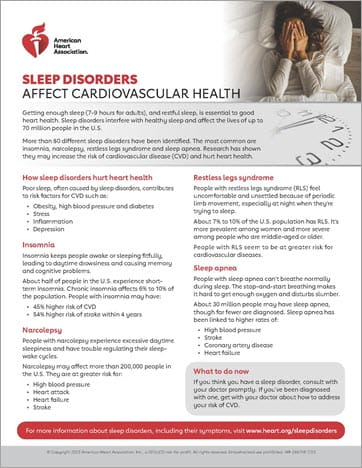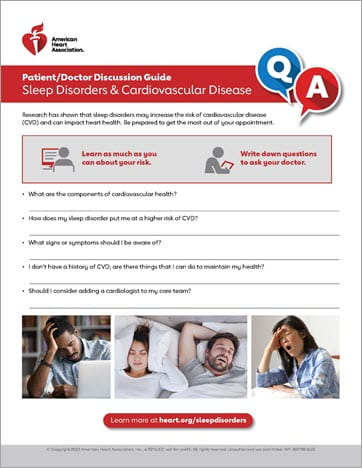Sleep Disorders and Heart Health

What are sleep disorders?
Sleep disorders are conditions that affect the quality, timing and amount of sleep. Getting the right amount of sleep is an essential component of good heart and brain health. The American Heart Association recommends 7-9 hours of sleep per night, but sleep disorders can make it difficult to get a healthy amount of sleep.
There are more than 80 different sleep disorders. The most common sleep disorders include insomnia, narcolepsy, restless legs syndrome and sleep apnea.
How many people are affected by sleep disorders?
Not getting enough sleep is a common problem. Roughly 1 in 3 adults reports not getting adequate rest on a regular basis. It’s estimated that about 50-70 million Americans have chronic or ongoing sleep disorders.
Sleep disorders and cardiovascular diseases
Getting enough quality sleep is an essential component of good heart and brain health. Sleep disorders cause sleep disruptions and make it difficult to get the sleep you need to stay healthy. In fact, sleep disorders have been linked to a higher risk of cardiovascular diseases.
A growing body of research highlights how sleep disorders and poor sleep can hurt your heart health:
- Poor sleep can cause major cardiovascular disease risk factors including obesity, high blood pressure and diabetes.
- Insufficient or irregular sleep can negatively influence diet, stress and other lifestyle factors that can raise the risk of cardiovascular disease.
- Excessive daytime sleepiness, which is a symptom of many sleep disorders, including hypersomnia, can lead to a greater risk of cardiovascular disease.
- Sleep deprivation and sleep disorders have also been linked to increased inflammation in your body, which can also elevate your risk of cardiovascular issues.
- Poor sleep and sleep disorders can cause depression and other mental health issues, which can hurt your heart health.
View How Sleep Disorders Affect Cardiovascular Health Fact Sheet (PDF)
When should you see a health care professional for a sleep disorder and concerns about cardiovascular health?
If you have a diagnosed sleep disorder, you should talk to your doctor about a plan to address your risk of cardiovascular disease. If you suspect you have a sleep disorder but haven’t been diagnosed with one, you should consult with your doctor to explore a possible diagnosis.







